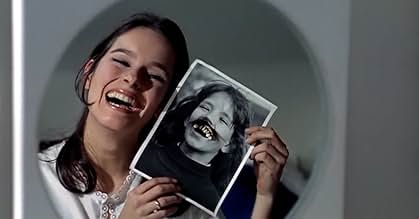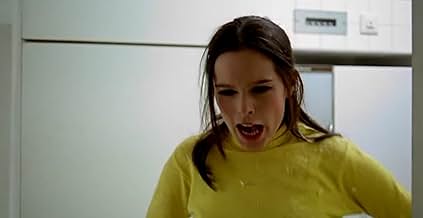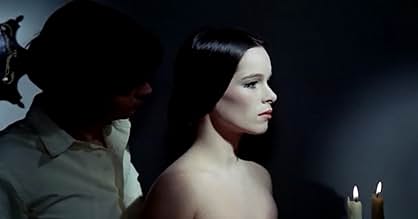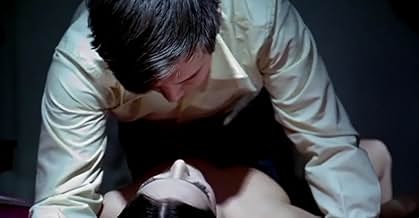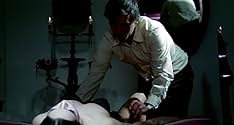Teresa es como una niña. Está frustrada por no tener hijos y sospecha que su marido le es infiel.Teresa es como una niña. Está frustrada por no tener hijos y sospecha que su marido le es infiel.Teresa es como una niña. Está frustrada por no tener hijos y sospecha que su marido le es infiel.
- Dirección
- Guión
- Reparto principal
- Premios
- 2 premios y 1 nominación en total
Teresa del Río
- Carmen
- (as Teresa del Rio)
María Elena Flores
- Rosa
- (as Maria Elena Flores)
Jesús Nieto
- Pedro
- (Spanish version)
- (voz)
Gloria Berrocal
- La Tía
- (sin acreditar)
Reseñas destacadas
Teresa (Geraldine Chaplin) is haunted by childhood trauma. She and her husband Pedro (Per Oscarsson) live in an isolated mansion. He's a successful auto executive, but at home, his wife is deteriorating. He starts playing her 'games' and it gets surreal.
This is a Spanish arthouse film. It's a little weird and it's a little slow. I would prefer a more isolated home with nobody other than the two leads. It's somewhat interesting to devolve into her father's relationship with her. That seems to have the juiciest possibilities. They do keep detouring into weirdness and they're not always compelling. I don't see pretending to be a dog as anything other than wondering if the pork chops are raw. I am interested in the crawfish for one reason. I don't know if people ate crawfish back then. I'm sure the Spanish did. They had to get them from somewhere. Did middle America other than Louisiana eat crawfish?
I expected more surrealism. It seems to be a lack of technical know-how or budget. There is a missed opportunity to go all out. Basically, a lot of this is these two actors playing around on a stage play. The father figure could do a great reveal, but this movie is a bit unfocused. It's trying to be profound and edgy. This has its moments.
This is a Spanish arthouse film. It's a little weird and it's a little slow. I would prefer a more isolated home with nobody other than the two leads. It's somewhat interesting to devolve into her father's relationship with her. That seems to have the juiciest possibilities. They do keep detouring into weirdness and they're not always compelling. I don't see pretending to be a dog as anything other than wondering if the pork chops are raw. I am interested in the crawfish for one reason. I don't know if people ate crawfish back then. I'm sure the Spanish did. They had to get them from somewhere. Did middle America other than Louisiana eat crawfish?
I expected more surrealism. It seems to be a lack of technical know-how or budget. There is a missed opportunity to go all out. Basically, a lot of this is these two actors playing around on a stage play. The father figure could do a great reveal, but this movie is a bit unfocused. It's trying to be profound and edgy. This has its moments.
Pedro and Teresa are a well-off couple who live in an ultramodern house of the Brutalist architectural school. When she inherits a lot of old-fashioned furniture from her family, she says she'll sell it, but instead moves it into their home, to his initial annoyance. Simultaneously, she begins reverting to childhood, starting with sleepwalking activities she doesn't remember later, then escalating into full-time childish games and impulsive, immature behavior. For a while Pedro tries to discourage all this. But then he relents, and the two withdraw from their real-world responsibilities into increasingly bizarre "games" and role-playing.
Essentially a two-character piece that might have worked as well onstage, despite Saura's assured, fairly "cinematic" direction, this is a well-made and well-acted movie that nonetheless feels like a rather forced, unnecessary exercise, more interesting in theory than practice. These people just aren't terribly interesting, as hard-working as the stars are. Oscarsson has just past 40 at this point but still looked boyish (despite his hair being greyed for this role), so he seems a little miscast as an essentially conservative, bourgeoise businessman. He seems to be impersonating a notion of adulthood, even before the "games" begin. Chaplin is on firmer ground for her skill set as the child-woman. But this kind of act is usually a little annoying (there's always something artificial and cloying about a grown-up trying to be "childlike"), and she is an actress more willing than most to really dig into a character's irksome side. (See nearly all her work for Altman.)
So it's more effortful than enjoyable watching these two performers play-act childbirth, being a doggie, etc. The film (on which Chaplin was a co-writer) seems more like a series of acting-class scenes than an organic whole in terms of creating rounded characters, real insight into the institution of marriage, or anything else concrete. The result is highly polished yet curiously empty, an exemplar of the kind of movie that would get a lot of attention (if qualified enthusiasm) at festivals, then sink like a stone in actual release, because there's really nothing here for audiences to hold onto.
There were a lot of navel-gazing dramas about deteriorating marriages around this time-and in the end, that proves to be all "Honeycomb" is really about. But while this movie is one of the more gracefully made among them, it's also among those with the least resonance. It's a sort of theatrical abstraction that invites admiration, but elicits no emotional engagement. Even the "tragic" ending is at once inevitable and purely schematic, arising not out of any psychological necessity but because the movie needs to justify itself with a "big finish."
Essentially a two-character piece that might have worked as well onstage, despite Saura's assured, fairly "cinematic" direction, this is a well-made and well-acted movie that nonetheless feels like a rather forced, unnecessary exercise, more interesting in theory than practice. These people just aren't terribly interesting, as hard-working as the stars are. Oscarsson has just past 40 at this point but still looked boyish (despite his hair being greyed for this role), so he seems a little miscast as an essentially conservative, bourgeoise businessman. He seems to be impersonating a notion of adulthood, even before the "games" begin. Chaplin is on firmer ground for her skill set as the child-woman. But this kind of act is usually a little annoying (there's always something artificial and cloying about a grown-up trying to be "childlike"), and she is an actress more willing than most to really dig into a character's irksome side. (See nearly all her work for Altman.)
So it's more effortful than enjoyable watching these two performers play-act childbirth, being a doggie, etc. The film (on which Chaplin was a co-writer) seems more like a series of acting-class scenes than an organic whole in terms of creating rounded characters, real insight into the institution of marriage, or anything else concrete. The result is highly polished yet curiously empty, an exemplar of the kind of movie that would get a lot of attention (if qualified enthusiasm) at festivals, then sink like a stone in actual release, because there's really nothing here for audiences to hold onto.
There were a lot of navel-gazing dramas about deteriorating marriages around this time-and in the end, that proves to be all "Honeycomb" is really about. But while this movie is one of the more gracefully made among them, it's also among those with the least resonance. It's a sort of theatrical abstraction that invites admiration, but elicits no emotional engagement. Even the "tragic" ending is at once inevitable and purely schematic, arising not out of any psychological necessity but because the movie needs to justify itself with a "big finish."
Don't get me wrong I enjoyed the movie. Its a good movie but it quickly goes off the rails.
Geraldine Chaplin (who co wrote the script along with Carlos Saura and Rafael Azcone) plays a woman name Teresa who is in a passionless marriage.
Per Occarson plays Pedro, the husband who is runs a auto manufacturing plant and not very interested in wife.
She receives furniture that once belong to her late parents. After she received the furniture she starts to act strange.
One weekend alone, they participate in role playing games and things get looney fast. I found the role playing games outlandish. I laughed at some of the scenes thinking if alcohol was involved in the writing process. Also, I suspect some of the role playing ideas came from Chaplin. If that is the case, she must be quiet the character.
I do wonder if Saura referenced his first marriage. There were some elements from Chaplin's past in the film, such as she attend an all girls Catholic boarding school and had a stern father.
What message Saura wanted to convey gets lost by the outrageous role playing scenes. (I have read that one of the messages of the movie was about Chaplin having a difficult time in breaking away from her father's shadow)
What saved the film was the acting by Chaplin and Occarson. They did great and they worked very well together.
Also, this was the one and only time Chaplin co wrote a screenplay with Saura.
Interesting fact: At first, Saura had Per Occarson speak the dialogue in Spanish. However, due to his Swedish accent, the dialogue was spoken in English.
In post production the film was dub in Spanish. Chaplin dub her own lines in Spanish and another actor was Occarson Spanish dub voice.
If you want to watch a bizarre film where a person gets aroused by having crawdads crawling all over them. Then this movie is for you!
Geraldine Chaplin (who co wrote the script along with Carlos Saura and Rafael Azcone) plays a woman name Teresa who is in a passionless marriage.
Per Occarson plays Pedro, the husband who is runs a auto manufacturing plant and not very interested in wife.
She receives furniture that once belong to her late parents. After she received the furniture she starts to act strange.
One weekend alone, they participate in role playing games and things get looney fast. I found the role playing games outlandish. I laughed at some of the scenes thinking if alcohol was involved in the writing process. Also, I suspect some of the role playing ideas came from Chaplin. If that is the case, she must be quiet the character.
I do wonder if Saura referenced his first marriage. There were some elements from Chaplin's past in the film, such as she attend an all girls Catholic boarding school and had a stern father.
What message Saura wanted to convey gets lost by the outrageous role playing scenes. (I have read that one of the messages of the movie was about Chaplin having a difficult time in breaking away from her father's shadow)
What saved the film was the acting by Chaplin and Occarson. They did great and they worked very well together.
Also, this was the one and only time Chaplin co wrote a screenplay with Saura.
Interesting fact: At first, Saura had Per Occarson speak the dialogue in Spanish. However, due to his Swedish accent, the dialogue was spoken in English.
In post production the film was dub in Spanish. Chaplin dub her own lines in Spanish and another actor was Occarson Spanish dub voice.
If you want to watch a bizarre film where a person gets aroused by having crawdads crawling all over them. Then this movie is for you!
10fenway-5
This bizarre movie was made in Spain with an international cast and revolves around the games and fantasies of its main characters, husband and wife, Per Oscarssen and Geraldine Chaplin. Their upper middle class marriage is dull, so they venture out into the shadowy realm of role playing and fantasizing. I'm not sure in what language this thing was originally filmed, but it was a badly dubbed version that I caught a couple of times on late, late television. The husband begins by trying to get his wife to don some racy underclothes; she is repulsed by them and sends them down the garbage disposal! Taking another tack, the husband summons his unresponsive wife to the basement, where he's waiting, very solemnly, behind a teacher's desk. He orders her to sit in a high-chair, which just does hold her. He then proceeds to lecture her (taking on the role of her father) about her unacceptable marks in school. She now responds as a young girl, calling him "Daddy", and bowing her head in shame. He releases her from the high-chair and promptly puts her across his knee for a sound spanking with a ruler on her pantied bottom. The film devolves from this point, to where the games become darker, finally involving a pistol. Strictly a weird film, but could have been much better.
In their huge Brutalist mansion, Per Oscarsson and Geraldine Chaplin send the servants away and hide from visitors to role play.
It's a movie I watched through the end to see if there was any point to it other than the apparent co-dependency of the characters. In the end I could not find any other major object, other than a possible political theme about the relationship of Spaniard with the Franco government. That, however, is both too obvious and too rarified to have any real sense of serious subtext. Just as there are film critics who see fascism in every German movie from 1919 through the end of the Second World War, you can shoehorn every serious Spanish movie of the second half of the Franco era into political commentary. Does the fact that Miss Chaplin and the movie's director, Carlos Saura, were in a twelve-year relationship that ended about 1980 have any bearing on this movie? Quite possibly, but it's too personal for an audience not hipped to that fact.
It's a movie I watched through the end to see if there was any point to it other than the apparent co-dependency of the characters. In the end I could not find any other major object, other than a possible political theme about the relationship of Spaniard with the Franco government. That, however, is both too obvious and too rarified to have any real sense of serious subtext. Just as there are film critics who see fascism in every German movie from 1919 through the end of the Second World War, you can shoehorn every serious Spanish movie of the second half of the Franco era into political commentary. Does the fact that Miss Chaplin and the movie's director, Carlos Saura, were in a twelve-year relationship that ended about 1980 have any bearing on this movie? Quite possibly, but it's too personal for an audience not hipped to that fact.
¿Sabías que...?
- ConexionesReferenced in Saura(s) (2017)
Selecciones populares
Inicia sesión para calificar y añadir a tu lista para recibir recomendaciones personalizadas
- How long is Honeycomb?Con tecnología de Alexa
Detalles
- Fecha de lanzamiento
- País de origen
- Sitio oficial
- Idioma
- Títulos en diferentes países
- Honeycomb
- Localizaciones del rodaje
- Empresas productoras
- Ver más compañías en los créditos en IMDbPro
- Duración
- 1h 42min(102 min)
- Mezcla de sonido
- Relación de aspecto
- 1.85 : 1
Contribuir a esta página
Sugerir un cambio o añadir el contenido que falta

